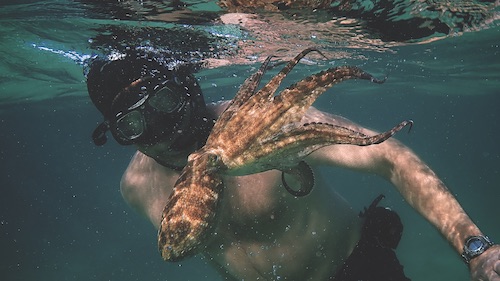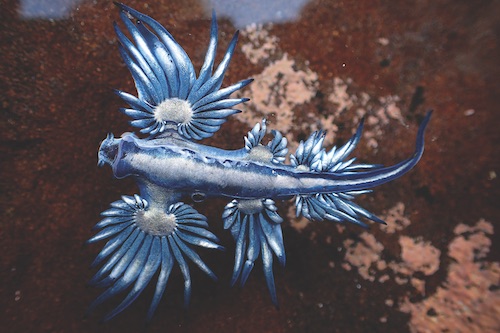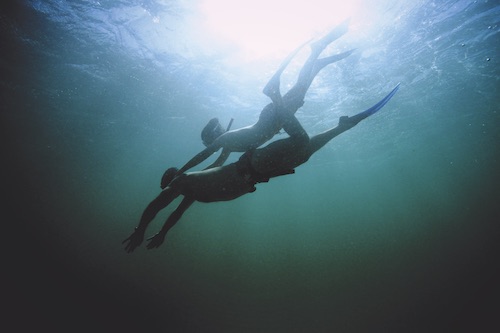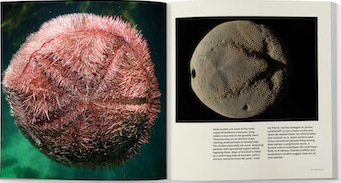 Stunning photos of fabulous creatures are a prerequisite for any book of nature photography.
Stunning photos of fabulous creatures are a prerequisite for any book of nature photography.
What’s surprising about Sea Change is how much extra also surges in – waves of adventure, emotional troughs, astonishing science and floods of philosophy.
Maybe that’s to be expected from Craig Foster, the wildlife filmmaker whose Netflix documentary My Octopus Teacher turned a cephalopod into a celebrated life coach.
Foster has spent more than eight years exploring the kelp forest off Simon’s Town, freediving without a wetsuit almost every day. He’d learned to track from the San people in the Kalahari and wanted to try underwater tracking to get to know the different creatures and their habits.
He was often joined by ocean conservationist Ross Frylinck, and this is the story of what they found, and how the process helped them both to rediscover themselves.
 As soon as Frylinck starts telling the story you’re hooked, because he paints such a vivid picture of being cold, scared and wondering what he’s doing following a man “into a frigid underwater forest in winter to look for sharks.”
As soon as Frylinck starts telling the story you’re hooked, because he paints such a vivid picture of being cold, scared and wondering what he’s doing following a man “into a frigid underwater forest in winter to look for sharks.”
It’s an absolute delight with its pictures and descriptions of remarkable creatures like giant clingfish, snakehead toadfish and dwarf sea hares. Stories of serial-killer snails, flesh-eating starfish and farming limpets give us a fascinating insight into a magical world.
These are not the usual calendar-style photos. Many look like colourful abstract art, while others are finely detailed. Some are out of focus or dark and moody, so you’re not sure what you’re seeing. That captures what it’s like underwater, especially when an influx of nutrients turns the ocean foggy.
It must have a torment trying to decide which pictures to feature from a catalogue spanning years. I imagine these have been selected to convey a sense of wonder, rather than the crisp beauty any good photographer could capture, without necessarily understanding what they’re seeing.
 Here we follow the tracks left by snails as they traipse over a sleeping stingray. It’s a subtle way of pulling you into their world, because you pore over the image trying to decipher it, as if Foster is teaching us the art of tracking too. I started to look at the photos first to guess what it was, before reading the details to see how wrong I was. A sand shrimp hovering above a shaggy sea hare – no, I didn’t guess that one.
Here we follow the tracks left by snails as they traipse over a sleeping stingray. It’s a subtle way of pulling you into their world, because you pore over the image trying to decipher it, as if Foster is teaching us the art of tracking too. I started to look at the photos first to guess what it was, before reading the details to see how wrong I was. A sand shrimp hovering above a shaggy sea hare – no, I didn’t guess that one.
Sea Change comes in various formats, including a hefty paving slab of a hardback at R859. Beautiful as it is, it’s too heavy to hold comfortably, so a more manageable soft cover version has been released. The secondary title has also changed from ‘Primal joy and the art of underwater tracking’ to the less mysterious ‘Return to the wild’.
But primal joy is at its heart, with Foster convinced that exposure to the cold radically alters the hormonal system, bringing us back into alignment with our original design. He writes evangelically of the natural high and transformative power of rediscovering a primal connection to nature that humans have lost, and how the dives brought him back into synch with the ‘one entity’ we are part of.
Intertwined with that is an equally compelling narrative from Frylinck, told in a chatty but touchingly honest way. They make a great double act, with Frylinck poking fun at Foster’s esoteric journey of the soul, while he’s the practical one treating it as a big adventure. “I was enjoying the diving and Craig’s madness, so it didn’t really matter to me if he was tripping in his own private fantasy kingdom,” he writes.
It may seem li ke a fantasy kingdom, but it’s a very real place filled with miraculous creatures sculpted by aeons of evolution, Foster parries back.
ke a fantasy kingdom, but it’s a very real place filled with miraculous creatures sculpted by aeons of evolution, Foster parries back.
Their two stories mesh together beautifully. Then Frylinck’s tone begins to alter. “I too found that immersion in ocean wilderness was changing me, but in some strange and disturbing ways. Memories and instincts that had been frozen and forgotten for most of my life were beginning to thaw, and forces that I didn’t understand and couldn’t control were awakening.” The mental journey that he undergoes becomes intriguing evidence of the theory that Foster is expounding.
It touched me too, and I dreamed a mad kaleidoscope of impossible creatures lurking behind the swaying fronds of kelp.
Sea Change by Craig Foster and Ross Frylinck (Quivertree Publications) is available from Exclusive Books at R859 and about R400 for the paperback version.